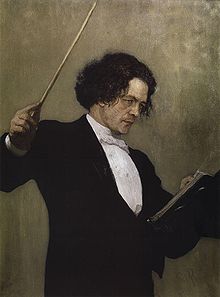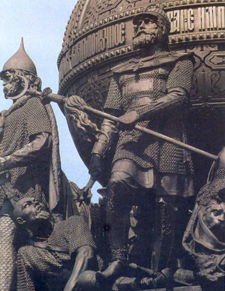- Dmitry Donskoy (opera)
-
Anton Rubinstein  Operas
Operas- Dmitry Donskoy (1852)
- Fomka the Fool (1853)
- Die Kinder der Heide (1861)
- Feramors (1863)
- Der Thurm zu Babel (1870)
- The Demon (1871)
- Die Maccabäer (1875)
- Néron (1879)
- The Merchant Kalashnikov (1880)
- Christus (1895)
Dmitry Donskoy (Russian: Дмитрий Донской), also known as The Battle of Kulikovo (Russian: Куликовская битва) was the first opera written by Anton Rubinstein. It was in 3 acts, with a libretto by Count Vladimir Sollogub and Vladimir Zotov, based on a drama by Dmitry Ozerov. First performed in 1852, the opera, apart from its overture, is now lost.
Contents
Background
Rubinstein asked for a libretto from Sollogub, who had also worked on Glinka's successful opera A Life for the Tsar, on what was ostensibly also a nationalist theme, the success of Dmitry Donskoy at the Battle of Kulikovo (1380) against the commander of the Tartar Blue Horde, Mamai. However he ignored the historic elements in favour of a fairly routine operatic love story.
The overture was completed first and was performed at a concert in 1850.[1] But Rubinstein faced trouble with the Russian censors, who forbade any stage presentation of Donskoy himself singing. Eventually the score was approved in 1851, and the first performance took place on 30 April 1852 at the Bolshoi Kamenny Theatre in St. Petersburg. The censors however insisted that the title be rendered as The Battle of Kulikovo. Rubinstein wrote to his mother 'This is not so terrible. The public will gradually find out what the real names are'.[2] The composer was pleased by the reception, although he complained about the quality of the singers: nonetheless he reported that 'The success was enthusiastic!' [3] However the opera had only four performances and does not seem to have been revived. Only the score of the overture has survived, together with one aria and some vocal parts in archives in St. Petersburg.
Roles
 Mamai at the feet of Dmitry Donskoi, Millennium Monument in Novgorod
Mamai at the feet of Dmitry Donskoi, Millennium Monument in Novgorod
Role Voice type Premiere Cast, 30 April [O.S. 18 April] 1852
(Conductor: )Dmitry Donskoy bass Osip Petrov Tverskoy tenor Lev Leonov Ksenia soprano Maria Stepanova Dervish Pavel Bulakhov Mamai baritone Semen Hulak-Artemovsky Synopsis
Donskoy wins the hand of Ksenia over his rival Tverskoy when he leads the victory over Mamai in the Battle of Kulikovo.
References
- Notes
- Sources
- Philip S. Taylor, Anton Rubinstein, A Life in Music, Indianapolis, 2007.
Categories:- Operas
- 1852 operas
- Russian-language operas
- Operas by Anton Rubinstein
- Lost operas
- Operas set in Russia
Wikimedia Foundation. 2010.
